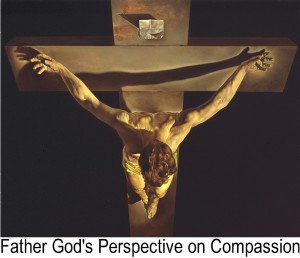Without compassion, even Biblical orthodoxy is ugly. Without Biblical orthodoxy, compassion is merely an artifact of human culture. Compassion is good for humanity, for sure, but compassion compelled by cultural norms is just another human attribute, just like greed, affection, or hairstyle.
The Christ came to earth as human in the form of Jesus of Nazareth. Key among His human attributes was His gregarious compassion. He “sighed” before healing a deaf mute (Mark 7:34). Jesus cried at the loss of a friend (John 11:35). With nails in His hands and feet, He expressed compassion for His mother (John 19:26).
 But, why was Jesus the Christ compassionate—simply because He took on human form? Not at all. Jesus was compassionate because He came to glorify Father God. For example, when He intentionally waited until His good friend Lazarus was definitively dead, He re-assured His critics “…it is for God’s glory so that God’s Son may be glorified through it.” (John 11:4)
But, why was Jesus the Christ compassionate—simply because He took on human form? Not at all. Jesus was compassionate because He came to glorify Father God. For example, when He intentionally waited until His good friend Lazarus was definitively dead, He re-assured His critics “…it is for God’s glory so that God’s Son may be glorified through it.” (John 11:4)
Showing compassion is easy. Doing compassion, however, is not easy. When we’re confronted with those who “should know better,” we want to look the other way. Or, if compassion is needed for those of a different club, clan, or country, we feel bad for them, and do nothing because they are not “us.”
The compassion we seek as believers is the compassion which comes from following the Christ—always to glorify the Lord God, always for all people, always. Not to glorify ourselves, our clan, our country, or our club.
When we are compassionate, it must be because He was compassionate first. It must be because He was compassionate for the leper, the unclean woman, the prostitute, the rich young ruler. His compassion for the sinner must be our compassion for each other. We must be compassionate because His compassion demonstrated the righteousness, the justice of Father God (Romans 3:25-26). Compassion demonstrates God’s righteousness. If our compassion comes not from God’s compassion, it is mere cultural hegemony.


 I am disturbed. Not really news to you? Just ask my wife—she’ll support this confession. But, regardless of my mental health, I am still disturbed. People are becoming more and more illiterate, or more correctly, faux-literate.
I am disturbed. Not really news to you? Just ask my wife—she’ll support this confession. But, regardless of my mental health, I am still disturbed. People are becoming more and more illiterate, or more correctly, faux-literate.